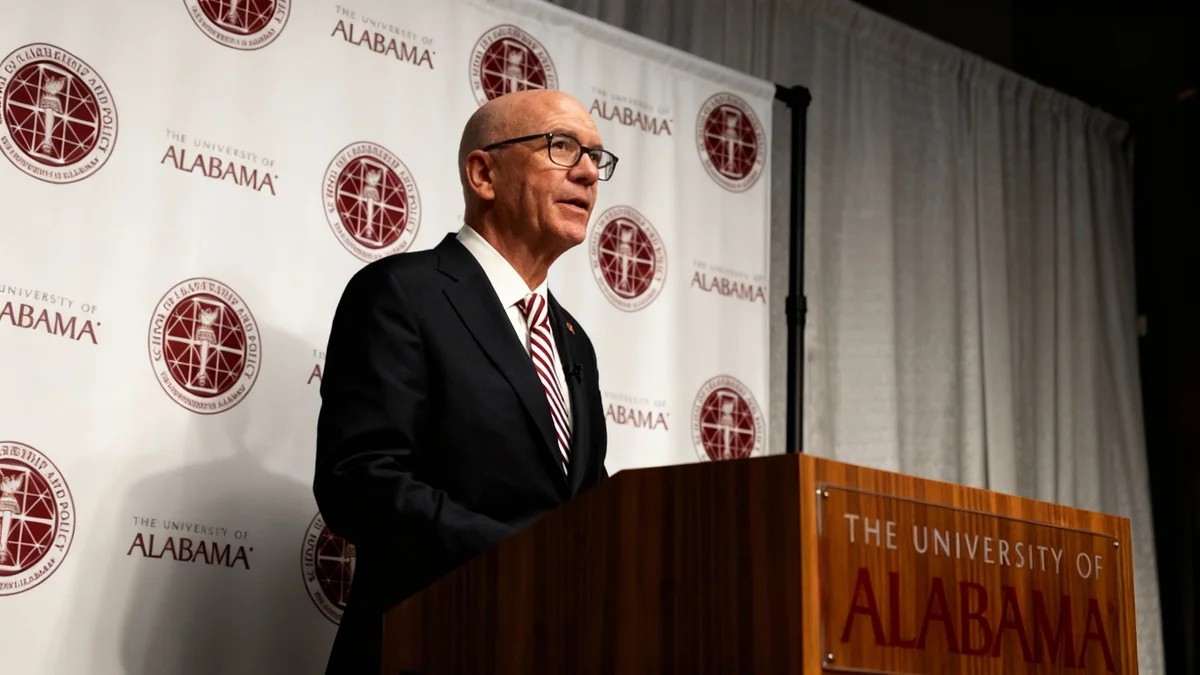The University of Alabama has announced the creation of a new academic division, the School of Leadership and Policy, aimed at educating the next generation of public servants and policymakers. The initiative is designed to address the complex challenges facing the state and the nation.
University President Peter Mohler confirmed the launch, highlighting the school's mission to provide practical, interdisciplinary training for students aspiring to careers in government, non-profit organizations, and public administration.
Key Takeaways
- The University of Alabama is establishing a new School of Leadership and Policy.
- The school will offer interdisciplinary and practice-oriented degree programs.
- Its primary mission is to train effective leaders and public servants to improve Alabama's well-being.
- The curriculum will likely focus on real-world problem-solving for social, economic, and civic issues.
A New Vision for Public Service Education
The University of Alabama is taking a significant step to cultivate future leaders with the establishment of its new School of Leadership and Policy. The announcement signals a focused effort by the university to create a dedicated academic home for students passionate about public service.
During the announcement, President Peter Mohler outlined the school's core objective. He stated that it will “provide interdisciplinary, practice-oriented education that prepares leaders to become effective leaders and public servants who contribute to Alabama’s social, economic and civil well being.”
“We are committed to preparing leaders who can make a tangible difference in our communities,” President Mohler explained. “This school is a direct investment in the future of Alabama.”
This move positions the university to become a central hub for policy research and leadership development within the state. The new school is expected to attract students who are not just interested in theory but are driven to implement practical solutions to pressing societal issues.
An Interdisciplinary and Practical Approach
A key feature of the new School of Leadership and Policy is its emphasis on an interdisciplinary curriculum. This approach acknowledges that modern challenges, such as economic inequality, public health crises, and infrastructure needs, cannot be solved from a single perspective.
Students will likely take courses that draw from various fields, including:
- Political Science and Public Administration
- Economics and Data Analysis
- Sociology and Urban Planning
- Communication and Law
The goal is to produce graduates who can analyze problems from multiple angles and collaborate effectively with experts across different sectors. This method moves beyond traditional academic silos to foster more holistic and effective problem-solving skills.
What is Practice-Oriented Education?
Unlike purely theoretical programs, a practice-oriented or practice-based curriculum focuses on hands-on application. This often includes internships with government agencies, capstone projects addressing real community problems, policy simulation labs, and direct engagement with current policymakers. The aim is to ensure graduates are ready for the immediate demands of a public service career.
The curriculum will also be practice-oriented, meaning it will heavily feature hands-on learning experiences. This could involve partnerships with state and local government agencies, allowing students to work on real policy initiatives before they even graduate. Such a focus ensures that academic learning is directly connected to the practical realities of public service.
Addressing Alabama’s Unique Challenges
While the school will prepare students for national and global roles, its mission has a distinct focus on Alabama. President Mohler’s statement directly links the school's purpose to improving the state’s “social, economic and civil well being.”
This suggests the curriculum will address issues pertinent to the region. Potential areas of focus could include rural development, healthcare access in underserved communities, educational reform, and sustainable economic growth. By training leaders with a deep understanding of these local challenges, the university aims to create a pipeline of talent dedicated to strengthening the state from within.
Focus on In-State Impact
Public universities often create policy schools to directly address the needs of their home state. Graduates frequently go on to work in state legislatures, city management, and local non-profits, creating a long-term feedback loop of expertise and service that benefits the institution and the public.
The new school could also serve as a non-partisan resource for current lawmakers and public officials in Alabama. It has the potential to become a center for policy analysis, providing data-driven research to inform decision-making on critical issues facing the state.
Building a Pipeline for Future Leaders
The creation of the School of Leadership and Policy is ultimately about building a sustainable pipeline of skilled and ethical leaders. By offering specialized degree programs, the university is creating a clear pathway for students who want to dedicate their careers to the public good.
These programs will equip students with essential skills in policy analysis, strategic communication, and ethical leadership. Graduates will be prepared for a wide range of careers where they can make a significant impact.
Potential Career Paths for Graduates:
- Policy Analyst for state or federal agencies
- City Manager or Urban Planner
- Non-Profit Program Director
- Legislative Aide or Staffer
- Community Development Manager
- Public Affairs Consultant
This initiative represents a long-term commitment from the University of Alabama. It is an acknowledgment that developing effective public servants is as crucial as training doctors, engineers, or teachers. The success of this school will be measured by the contributions its graduates make to Alabama and beyond in the decades to come.





